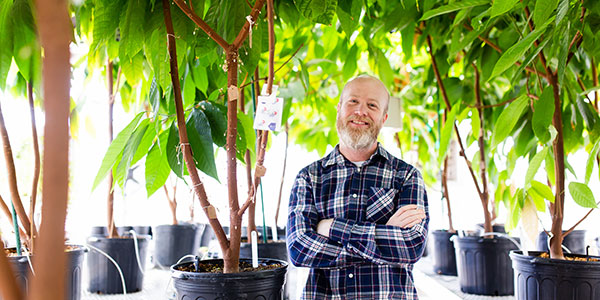On Valentine’s Day, thank someone you don’t meet
💕
As a professor of entomology and plant pathology at the University of Tennessee’s Agricultural Research Institute, DeWayne Shoemaker knows where the magic of Valentine’s Day chocolate boxes really begins. “I’m passionate about chocolate,” said Shoemaker, who traveled to the Central American country of Belize to study cocoa.
Tiny gall and biting midges, cursed as midges not seen in America on summer evenings, are essential for pollinating cacao tree flowers. “Cocoa flowers are small and have complex reproductive structures, so it may be that only smaller insects, such as midges, can easily access and pollinate the reproductive parts of the flowers,” Shoemaker said.
Seeds or beans are grown from the trees, which are shipped around the world and made into chocolate using a fairly complex process. “Ninety-five percent of the cocoa is grown on small farms,” Shoemaker said. “There are 50 million people in the world who live on cocoa.”
Shoemaker has twice taught Chocolate-Bean to Bar, an introductory general education course at UT Herbert Agricultural College that covers cocoa and how chocolate is produced, shipped, and marketed.
“The students were very enthusiastic,” said doctoral student Zaklina Pavlovic, who served as a teaching assistant for more than 100 students who took classes in the fall. “Professor Shoemaker brought samples of different kinds of chocolate to each student, and they loved it. They were also interested in the social issues we discussed, such as slavery and child labor that occurred in certain areas. It got them thinking,” Where does my food come from? They would love to know that workers in Brazil’s Bahia region have introduced a disease called witch’s broom, which is destroying the region’s cocoa production. They would have liked to raise the price of the product. Instead, the region’s production will never be will be the same.”
 Professor DeWayne Shoemaker poses with the cocoa tree.
Professor DeWayne Shoemaker poses with the cocoa tree.
Now, Shoemaker has joined his passion for chocolate and research, creating a series of multidisciplinary courses that take students from flies to beans, hands-on chocolate labs, and business research focused on the value chain of global chocolate companies. “My vision is to create an experiential project with cocoa at its core.”
He received approval and plans to bring students to Belize for the first course of the new program when the pandemic hits in 2020. Now scheduled for next year, the course will include an appreciation for growing cacao trees and their role in tropical ecology. It will also incorporate a service learning project within the community.
In the Chocolate Lab, students will learn the secrets of making chocolate, from baking beans to making chocolate bars, and creating different flavors that the world craves. The final course will be a business course on the complex supply chain, from harvesting the beans and shipping them to the final product in major companies and stores around the world.
“I learned a lot more than I expected,” said Nidhi Menon, a biomedical engineering major, introducing the course. “We learned the ins and outs of the chocolate industry – from beans to bars. But I was surprised to learn how much cocoa growers were affected by the industry, given their own income and concerned about the potential impact of the black on their farms. Potential diseases like pod rot or witch’s broom. For the final project, I’m going to take a deeper look at the environmental impact of the cocoa industry and see how big companies are dealing with environmental issues compared to smaller local companies.”
—
get in touch with
Patty McDaniels (615-835-4570, pmcdaniels@tennessee.edu)
Brooks Clark (865-310-1277, nclark5@utk.edu)
Sharing is caring 💕 don’t forget to share this post on Pinterest !
